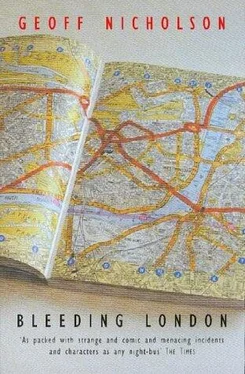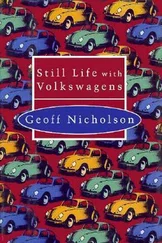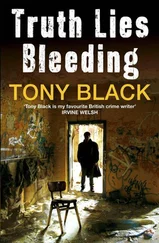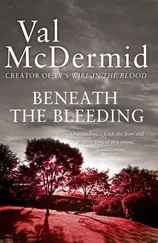“But death is not a literary form. It is formless and always with us; common and ubiquitous, just like sex. A long time ago I had a girlfriend who said there wasn’t a single square foot of London where somebody hadn’t had sex. I’m sure she was right and I feel the same must be true about death. Every square inch of the city must be infused with mortality. Boadicea, the plague, the Luftwaffe, queer-bashers, gangland shootings, natural causes; they’ve all done their bit.
“Men die in the street, of heart attacks, of haemorrhages, of knifings, shootings, road accidents. A passing bomb blows them to smithereens. An arsonist torches a cinema full of porn aficionados . Old ladies die in council flats, of hypothermia, of fumes from unventilated water heaters, or they’re beaten to death by burglars hunting down their life savings. Faces burned in the King’s Cross tube fire, lives lost on the river when the Marchioness went down. The hospitals that bury their failures. It goes on.
“London has its share of wife murderers, baby killers, sex killers; odd combinations of the above. We are familiar with casual death, with overdoses, impurities, the air bubble locked in the vein. Drunks falling out of trains, coppers shot in the course of routine inquiries. Londoners killed in the crossfire.
“Dylan Thomas continued the long process of drinking himself to death in pubs not far from here, but he had to go to New York to fully realize his aims. Jimi Hendrix ended it all in London, whether accidentally or not, by choking on a cocktail of vomit and drugs, in a house in Netting Hill next door to where Handel had once lived. Kenneth Halliwell killed himself in London too, having first hammered out the brains of his errant ‘first husband’. Here, in Holborn, Thomas Chatterton poisoned himself with arsenic, finding that preferable to literally starving to death when his literary career foundered; also finding it preferable to accepting a meal from his landlady. These artists are often poseurs as well as everything else.
“London lacks one of those truly great sites from which suicides can propel themselves. The railway bridge across Archway Road attracts a few, but we have no famous lover’s leap, no equivalent of the Golden Gate Bridge. The Monument, commemorating the Great Fire, used to be a favourite place but the top was eventually caged in 1842. So suicide tends to be an intramural matter, something domestic, performed in bathtubs and bedrooms, a private ritual. There are a few who choose to end it all by throwing themselves under tube trains, and this is a messy end, traumatic for the train driver and for those who see it, but essentially a trivial end. All one really succeeds in doing is irritating a few thousand commuters and making them late for their suppers or their night at the cinema, though I suppose this offers certain desperate people more power than they ever had while alive.
“So if you were going to do the dirty deed, where would you choose? I’ve always thought that the Telecom Tower, formerly the Post Office Tower, would be a reasonable place from which to launch yourself; unfortunately it’s not open to the public. The Whispering Gallery in St Paul’s would surely be a spectacular way to go. Imagine yourself falling backwards through all that space, the great dome receding as the wind whips the back of your head and you accelerate towards the cold, solid floor. You’d have an audience, and there’d be people on hand to pray for your soul; but even the most agnostic of us might fret about committing suicide in church.
“The river is a possibility. They say that death by drowning isn’t such a bad way to go, that a strange calm comes over the drowning man. Drinking a couple of pints of raw Thames water might be equally lethal, though far less peaceful.
“One might go to the Isle of Dogs, enter a pub, get chatting to some Millwall fans and suggest that there was a homosexual component to their characters. That would be as good as certain death. Being a black man and entering the same pub would probably have much the same effect.”
Stuart walked and talked for forty minutes or more. His unrehearsed and unstoppable flow had a relentlessness about it that kept most of his audience with him, though he did notice that a couple of the widows had slipped away, the talk of death too much for them. But for the others, his macabre talk had a grim appeal.
When he paused once, for breath and for effect, an old man in a shiny Charlotteville baseball cap got up the courage to say, “Excuse me, sir, I have the feelin’ we may be on the incorrect tour,” but when Stuart stared at him with flaming, intense eyes he added, “Not that I mind. This is entertainin’ as all get out.”
Stuart carried on with his spiel, regaling them with stories about the suicide of Judy Garland in the bathroom of a mews house near Sloane Square, where he’d once been to a party.
Finally, and even he wasn’t quite sure of its relevance, he told them about the Plague Piper, an itinerant musician who in plague-ridden London was found asleep in a doorway, tossed on to a death cart, dumped into a mass grave and only saved from being buried alive by his dog who knew what the men of the plague did not, that his master wasn’t dead, simply dead drunk.
Two of the group applauded at the end of this story but Stuart stared daggers at them and told them it was no laughing matter.
He said, “In the end there’s no need to look for death, much less look for a methodology. The modern London walker need do nothing but keep walking, keep on the move. Wherever he goes death will come looking for him, and it will surely find him.”
The tour didn’t so much end as abruptly cease. Stuart had said all he had to say. He looked at the faces of the group; some were blank, some confused, but most were still alert and demanding. They wanted more, but he realized he had no more to give them. He felt empty, a bit of a fraud and a show-off. He had no encore.
Colin was looking at him in appalled awe, and Stuart wondered what Colin would have to say when he got back to the office. Would he describe this little side show to the other guides? Would he tell Anita?
Stuart wanted very much to be somewhere else. At that moment a black cab pulled up beside him and let out its passenger. Stuart turned his back on the tour group, got into the now empty taxi and departed, giving a regal wave as he went.
One of the adolescent girls said to the other, “You know I bet he’d have been a real good person to ask about the tree where Marc Bolan died,” but it was too late. The walkers were left in some confusion, certain that they’d seen something unusual but not absolutely sure that they’d had their money’s worth. Poor Colin, hapless and speechless, fluttered his arms a little and tried hard to get the group’s attention.
Apart from when he’d been at big football matches or rock gigs, Mick had never seen such a crowded men’s public toilet. At first there appeared to be a queue, three or four men skulking about the entrance as though waiting for a urinal to come free, but then Mick saw that there already were free urinals, and that the men were waiting for something quite different.
He didn’t object. It was OK by him. In a way it was very useful. It gave him cover, a reason to be standing around doing nothing, while in fact keeping an eye on his next victim. For Robin Lawton, the last man on Cabby’s list, was in position at the far end of the row of urinals, poised, going about his business. He had his back to Mick but it was apparent from his body language, from the steady, regular movement of his hand, arm and shoulder, that he was masturbating, coaxing himself to an erection that could be displayed to his fellow cottagers.
Читать дальше












